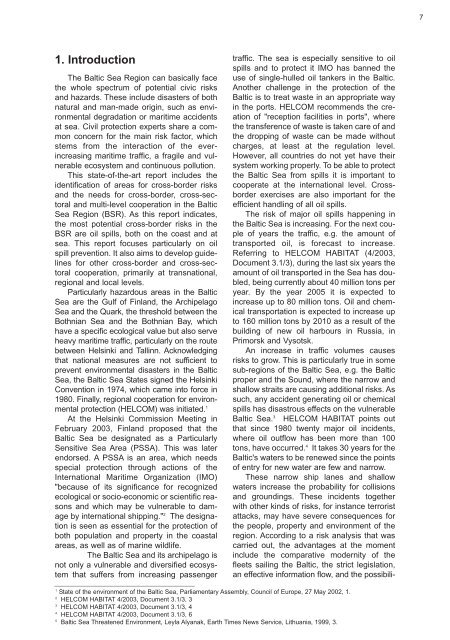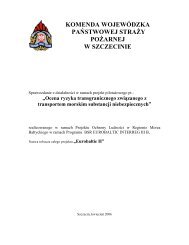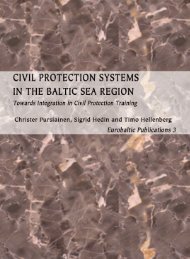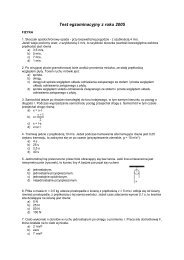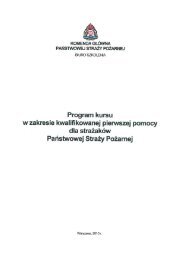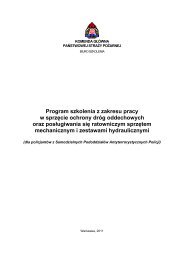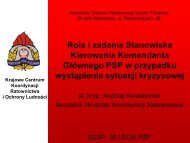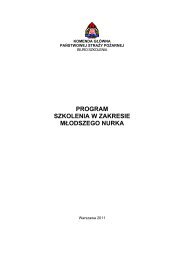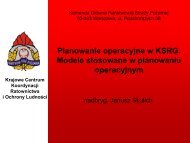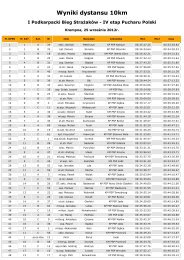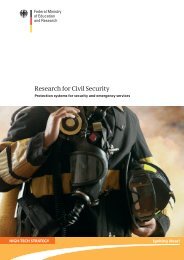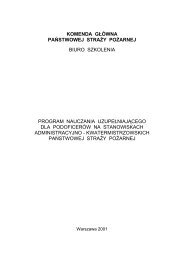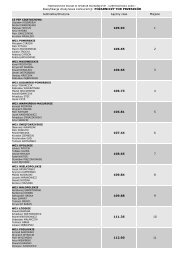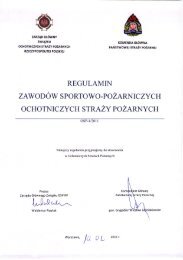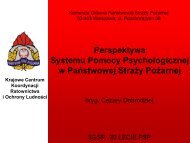Cross-Border Risks in the Baltic Sea Region: Lessons to ... - Helsinki.fi
Cross-Border Risks in the Baltic Sea Region: Lessons to ... - Helsinki.fi
Cross-Border Risks in the Baltic Sea Region: Lessons to ... - Helsinki.fi
You also want an ePaper? Increase the reach of your titles
YUMPU automatically turns print PDFs into web optimized ePapers that Google loves.
7<br />
1. Introduction<br />
The <strong>Baltic</strong> <strong>Sea</strong> <strong>Region</strong> can basically face<br />
<strong>the</strong> whole spectrum of potential civic risks<br />
and hazards. These <strong>in</strong>clude disasters of both<br />
natural and man-made orig<strong>in</strong>, such as environmental<br />
degradation or maritime accidents<br />
at sea. Civil protection experts share a common<br />
concern for <strong>the</strong> ma<strong>in</strong> risk fac<strong>to</strong>r, which<br />
stems from <strong>the</strong> <strong>in</strong>teraction of <strong>the</strong> ever<strong>in</strong>creas<strong>in</strong>g<br />
maritime traf<strong>fi</strong>c, a fragile and vulnerable<br />
ecosystem and cont<strong>in</strong>uous pollution.<br />
This state-of-<strong>the</strong>-art report <strong>in</strong>cludes <strong>the</strong><br />
identi<strong>fi</strong>cation of areas for cross-border risks<br />
and <strong>the</strong> needs for cross-border, cross-sec<strong>to</strong>ral<br />
and multi-level cooperation <strong>in</strong> <strong>the</strong> <strong>Baltic</strong><br />
<strong>Sea</strong> <strong>Region</strong> (BSR). As this report <strong>in</strong>dicates,<br />
<strong>the</strong> most potential cross-border risks <strong>in</strong> <strong>the</strong><br />
BSR are oil spills, both on <strong>the</strong> coast and at<br />
sea. This report focuses particularly on oil<br />
spill prevention. It also aims <strong>to</strong> develop guidel<strong>in</strong>es<br />
for o<strong>the</strong>r cross-border and cross-sec<strong>to</strong>ral<br />
cooperation, primarily at transnational,<br />
regional and local levels.<br />
Particularly hazardous areas <strong>in</strong> <strong>the</strong> <strong>Baltic</strong><br />
<strong>Sea</strong> are <strong>the</strong> Gulf of F<strong>in</strong>land, <strong>the</strong> Archipelago<br />
<strong>Sea</strong> and <strong>the</strong> Quark, <strong>the</strong> threshold between <strong>the</strong><br />
Bothnian <strong>Sea</strong> and <strong>the</strong> Bothnian Bay, which<br />
have a speci<strong>fi</strong>c ecological value but also serve<br />
heavy maritime traf<strong>fi</strong>c, particularly on <strong>the</strong> route<br />
between Hels<strong>in</strong>ki and Tall<strong>in</strong>n. Acknowledg<strong>in</strong>g<br />
that national measures are not suf<strong>fi</strong>cient <strong>to</strong><br />
prevent environmental disasters <strong>in</strong> <strong>the</strong> <strong>Baltic</strong><br />
<strong>Sea</strong>, <strong>the</strong> <strong>Baltic</strong> <strong>Sea</strong> States signed <strong>the</strong> Hels<strong>in</strong>ki<br />
Convention <strong>in</strong> 1974, which came <strong>in</strong><strong>to</strong> force <strong>in</strong><br />
1980. F<strong>in</strong>ally, regional cooperation for environmental<br />
protection (HELCOM) was <strong>in</strong>itiated. 1<br />
At <strong>the</strong> Hels<strong>in</strong>ki Commission Meet<strong>in</strong>g <strong>in</strong><br />
February 2003, F<strong>in</strong>land proposed that <strong>the</strong><br />
<strong>Baltic</strong> <strong>Sea</strong> be designated as a Particularly<br />
Sensitive <strong>Sea</strong> Area (PSSA). This was later<br />
endorsed. A PSSA is an area, which needs<br />
special protection through actions of <strong>the</strong><br />
International Maritime Organization (IMO)<br />
"because of its signi<strong>fi</strong>cance for recognized<br />
ecological or socio-economic or scienti<strong>fi</strong>c reasons<br />
and which may be vulnerable <strong>to</strong> damage<br />
by <strong>in</strong>ternational shipp<strong>in</strong>g." 2 The designation<br />
is seen as essential for <strong>the</strong> protection of<br />
both population and property <strong>in</strong> <strong>the</strong> coastal<br />
areas, as well as of mar<strong>in</strong>e wildlife.<br />
The <strong>Baltic</strong> <strong>Sea</strong> and its archipelago is<br />
not only a vulnerable and diversi<strong>fi</strong>ed ecosystem<br />
that suffers from <strong>in</strong>creas<strong>in</strong>g passenger<br />
traf<strong>fi</strong>c. The sea is especially sensitive <strong>to</strong> oil<br />
spills and <strong>to</strong> protect it IMO has banned <strong>the</strong><br />
use of s<strong>in</strong>gle-hulled oil tankers <strong>in</strong> <strong>the</strong> <strong>Baltic</strong>.<br />
Ano<strong>the</strong>r challenge <strong>in</strong> <strong>the</strong> protection of <strong>the</strong><br />
<strong>Baltic</strong> is <strong>to</strong> treat waste <strong>in</strong> an appropriate way<br />
<strong>in</strong> <strong>the</strong> ports. HELCOM recommends <strong>the</strong> creation<br />
of "reception facilities <strong>in</strong> ports", where<br />
<strong>the</strong> transference of waste is taken care of and<br />
<strong>the</strong> dropp<strong>in</strong>g of waste can be made without<br />
charges, at least at <strong>the</strong> regulation level.<br />
However, all countries do not yet have <strong>the</strong>ir<br />
system work<strong>in</strong>g properly. To be able <strong>to</strong> protect<br />
<strong>the</strong> <strong>Baltic</strong> <strong>Sea</strong> from spills it is important <strong>to</strong><br />
cooperate at <strong>the</strong> <strong>in</strong>ternational level. <strong>Cross</strong>border<br />
exercises are also important for <strong>the</strong><br />
ef<strong>fi</strong>cient handl<strong>in</strong>g of all oil spills.<br />
The risk of major oil spills happen<strong>in</strong>g <strong>in</strong><br />
<strong>the</strong> <strong>Baltic</strong> <strong>Sea</strong> is <strong>in</strong>creas<strong>in</strong>g. For <strong>the</strong> next couple<br />
of years <strong>the</strong> traf<strong>fi</strong>c, e.g. <strong>the</strong> amount of<br />
transported oil, is forecast <strong>to</strong> <strong>in</strong>crease.<br />
Referr<strong>in</strong>g <strong>to</strong> HELCOM HABITAT (4/2003,<br />
Document 3.1/3), dur<strong>in</strong>g <strong>the</strong> last six years <strong>the</strong><br />
amount of oil transported <strong>in</strong> <strong>the</strong> <strong>Sea</strong> has doubled,<br />
be<strong>in</strong>g currently about 40 million <strong>to</strong>ns per<br />
year. By <strong>the</strong> year 2005 it is expected <strong>to</strong><br />
<strong>in</strong>crease up <strong>to</strong> 80 million <strong>to</strong>ns. Oil and chemical<br />
transportation is expected <strong>to</strong> <strong>in</strong>crease up<br />
<strong>to</strong> 160 million <strong>to</strong>ns by 2010 as a result of <strong>the</strong><br />
build<strong>in</strong>g of new oil harbours <strong>in</strong> Russia, <strong>in</strong><br />
Primorsk and Vysotsk.<br />
An <strong>in</strong>crease <strong>in</strong> traf<strong>fi</strong>c volumes causes<br />
risks <strong>to</strong> grow. This is particularly true <strong>in</strong> some<br />
sub-regions of <strong>the</strong> <strong>Baltic</strong> <strong>Sea</strong>, e.g. <strong>the</strong> <strong>Baltic</strong><br />
proper and <strong>the</strong> Sound, where <strong>the</strong> narrow and<br />
shallow straits are caus<strong>in</strong>g additional risks. As<br />
such, any accident generat<strong>in</strong>g oil or chemical<br />
spills has disastrous effects on <strong>the</strong> vulnerable<br />
<strong>Baltic</strong> <strong>Sea</strong>. 3 HELCOM HABITAT po<strong>in</strong>ts out<br />
that s<strong>in</strong>ce 1980 twenty major oil <strong>in</strong>cidents,<br />
where oil outflow has been more than 100<br />
<strong>to</strong>ns, have occurred. 4 It takes 30 years for <strong>the</strong><br />
<strong>Baltic</strong>'s waters <strong>to</strong> be renewed s<strong>in</strong>ce <strong>the</strong> po<strong>in</strong>ts<br />
of entry for new water are few and narrow.<br />
These narrow ship lanes and shallow<br />
waters <strong>in</strong>crease <strong>the</strong> probability for collisions<br />
and ground<strong>in</strong>gs. These <strong>in</strong>cidents <strong>to</strong>ge<strong>the</strong>r<br />
with o<strong>the</strong>r k<strong>in</strong>ds of risks, for <strong>in</strong>stance terrorist<br />
attacks, may have severe consequences for<br />
<strong>the</strong> people, property and environment of <strong>the</strong><br />
region. Accord<strong>in</strong>g <strong>to</strong> a risk analysis that was<br />
carried out, <strong>the</strong> advantages at <strong>the</strong> moment<br />
<strong>in</strong>clude <strong>the</strong> comparative modernity of <strong>the</strong><br />
fleets sail<strong>in</strong>g <strong>the</strong> <strong>Baltic</strong>, <strong>the</strong> strict legislation,<br />
an effective <strong>in</strong>formation flow, and <strong>the</strong> possibili-<br />
1<br />
State of <strong>the</strong> environment of <strong>the</strong> <strong>Baltic</strong> <strong>Sea</strong>, Parliamentary Assembly, Council of Europe, 27 May 2002, 1.<br />
2<br />
HELCOM HABITAT 4/2003, Document 3.1/3, 3<br />
3<br />
HELCOM HABITAT 4/2003, Document 3.1/3, 4<br />
4<br />
HELCOM HABITAT 4/2003, Document 3.1/3, 6<br />
5<br />
<strong>Baltic</strong> <strong>Sea</strong> Threatened Environment, Leyla Alyanak, Earth Times News Service, Lithuania, 1999, 3.


